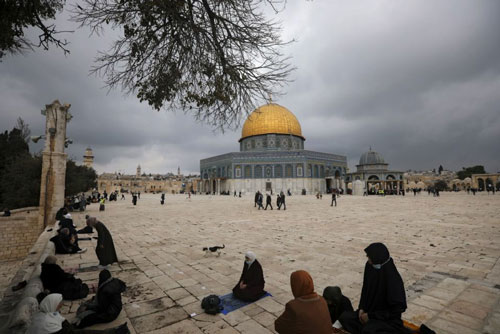Jerusalem
When the United Arab Emirates agreed to normalize relations with Israel, the Palestinians decried the move as a “betrayal” of both Jerusalem, where they hope to establish the capital of their future state, and the Al-Aqsa mosque compound, the city’s holiest Muslim site.
But with Israel now courting wealthy Gulf tourists and establishing new air links to the major travel hubs of Dubai and Abu Dhabi, Palestinians in east Jerusalem could soon see a tourism boon after months in which the coronavirus transformed the Holy City into a ghost town.
“There will be some benefits for the Palestinian sector of tourism, and this is what I’m hoping for,” said Sami Abu-Dayyeh, a Palestinian businessman in east Jerusalem who owns four hotels and a tourism agency. “Forget about politics, we have to survive.” Palestinian leaders have sharply rejected the recent decisions by the UAE, Bahrain and Sudan to establish ties with Israel because they severely weakened a longstanding Arab consensus that recognition only be extended in return for Palestinian statehood.
The Palestinians hope to establish a state including east Jerusalem and the West Bank, territories occupied by Israel in the 1967 war. Arab support, seen as a key form of leverage in decades of on-again, off-again peace negotiations, now appears to be evaporating, leaving the Palestinians arguably weaker and more isolated than at any point in recent history.
In a striking development last week, a delegation of Israeli settlers visited the Emirates to discuss business opportunities. The Palestinians view settlements in the West Bank and east Jerusalem as the main obstacle to peace, and most of the international community considers them to be illegal.
But the prospect of expanded religious tourism could end up benefiting Israelis and Palestinians alike, as wealthy Gulf tourists and Muslim pilgrims from further afield take advantage of new air links and improved relations to visit Al-Aqsa and other holy sites.
Israel considers all of Jerusalem to be its capital, and its Jerusalem Municipality is organizing conferences and seminars to help tourism operators market the city to Gulf travelers.
“I’m very excited because I think it opens us up to a new era of Muslim tourism that we never really had,” said Fleur Hassan-Nahoum, the deputy mayor of Jerusalem. “Even though we have peace with Jordan and Egypt, I’ve never really seen any Egyptian tourists or Jordanian tourists because the peace wasn’t a warm peace.”
Hassan-Nahoum, who recently visited the Emirates and is a co-founder of the UAE-Israel Business Council, said the municipality is reaching out to local Arab tour operators to ensure the benefits extend to all.
“You have mixed feelings,” she said. “Some of them are a little bit suspicious, (but) most of them understand that this is going to be incredibly prosperous for them, because ultimately they’re Arab speaking and so they have, I think, a unique advantage.”
Abu-Dayyeh expects up to 28 flights a day arriving in Tel Aviv from Dubai and Abu Dhabi, global travel hubs for long-haul carriers Emirates and Etihad, making it easier for travelers from the Far East and South America to reach the Holy Land.
He’s confident Palestinian operators will be able to compete. “We’re on the ground here and we’ve been giving this service for many years, for hundreds of years,” he said.—AP









